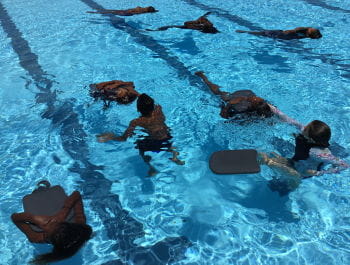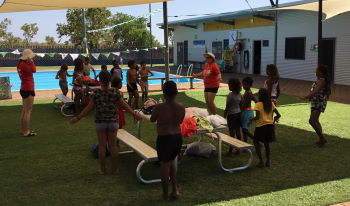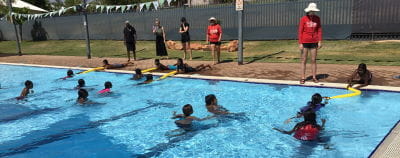Bayulu kids learn to Swim and Survive at Fitzroy Crossing Remote Pool
 For children in remote communities learning vital swimming and water safety skills can be out of reach due to distance and a lack of available swimming pools in these areas. This is why the Royal Life Saving Remote Aboriginal Swimming Pool program is making such a difference. The pools provide a safe place for children and adults in these communities to learn swimming skills and build positive community relationships.
For children in remote communities learning vital swimming and water safety skills can be out of reach due to distance and a lack of available swimming pools in these areas. This is why the Royal Life Saving Remote Aboriginal Swimming Pool program is making such a difference. The pools provide a safe place for children and adults in these communities to learn swimming skills and build positive community relationships.
Recently 120 children from the Bayulu Remote Community School took part in Swim and Survive lessons at the Fitzroy Crossing Remote Aboriginal Swimming Pool. The school is located on Gooniyandi country, 15km from Fitzroy Crossing in our Kimberley region, and was the WA’s first station school, starting in a cave back in 1957.
The children from Bayulu attended the pool daily for two weeks, as part of a partnership between Royal Life Saving WA and the Education Department, which is delivering swimming lessons to 15 schools in remote communities of WA. Royal Life Saving sent swim instructor Niamh Hurley to Fitzroy to assist pool manager Adele Caporn in presenting the lessons, and she says it was an amazing experience.
“Before going to Fitzroy I had a vision of what it would be like, however my experience exceeded any of my expectations and I learnt more about the aboriginal culture, beliefs and way of life than I would through any course or education. Being exposed to a way of life I have never experienced before was definitely very eye opening and has made me very passionate in ensuring these young kids in communities such as Fitzroy Crossing are provided with the same opportunities as kids anywhere else in Australia.”
 Niamh says she was inspired to see the impact the lessons had on the children she taught. “Swimming lessons give them essential skills in the water that are needed in the Fitzroy area when it comes to flooding season. I was very surprised when I learned that many of the kids, as young as 4, with little swimming abilities were going swimming in the rivers alone. By attending swimming lessons they are learning how to save themselves if they fall into the water and what to do if their siblings or friends need help.”
Niamh says she was inspired to see the impact the lessons had on the children she taught. “Swimming lessons give them essential skills in the water that are needed in the Fitzroy area when it comes to flooding season. I was very surprised when I learned that many of the kids, as young as 4, with little swimming abilities were going swimming in the rivers alone. By attending swimming lessons they are learning how to save themselves if they fall into the water and what to do if their siblings or friends need help.”
Apart from providing these vital water safety skills, swimming lessons provide a range of other health benefits such as improving hygiene, reducing rates of infection and increasing physical activity. Royal Life Saving is proud to be partnering with the Education Department to ensure these children have access to such a vital program.
The Remote Aboriginal Swimming Pool program is supported by the Department of Communities and Principal Community Partner BHP. You can find out more by clicking the link below.
